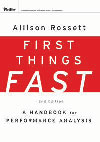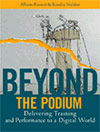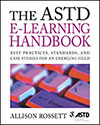Often, current and former graduate students ask for advice about how to be successful when they interview for instructional design positions. Yes, I have my opinions, but I wanted you to hear from someone I admire. Let's welcome guest blogger, Alice Cutter, who has been interviewing MANY IDs for positions in her firm. And these are not the first ID positions she has attempted to fill. Not by a long shot. Here's what Alice wrote: We just finished a job search to find four Instructional Designers. One of our requirements is that the ID being hired must have experience in all phases of instructional design. There were hundreds of resumes … [Read more...]
The Tale of a Job Hunt
Meet guest blogger, Marci Paino. Here is the story of her search for a new position. On the trail to a new position This is the tale of a job hunt that I began in November, 2011. A few hours were spent updating and tweaking a resume. Even more time was spent searching for the ideal job openings and filling out the specialized online applications. A bit more time was spent reaching out to a network of colleagues and mentors. The roller coaster ride was just beginning! Would they like me? I eagerly anticipated a response after submitting an application. Surely one of these openings is the one for me. Some companies sent an automated … [Read more...]
Cal State Online Plays Small Ball
The California State University (CSU), the largest state university system in the United States, has at long last settled on an online learning strategy for its 23 campuses. With more than three decades as a professor in the CSU, now retired, I decided to take a look. The goal. "The goal is to increase capacity at California State, where massive budget cuts have coincided with a rising demand for higher ed degrees," wrote Steve Kolowich in a review of the plan. The doubts. Many faculty extend their doubts about CSU leadership to online education, an easy target for professorial skepticism. What about quality? What about relationships? … [Read more...]
Tell us about your evaluation practices and priorities, please
Metrics in the Learning Organization A few years ago, I and Dr. Jim Marshall from San Diego State University studied how people are using learning technologies. What we found surprised us, as it will you. In the midst of other less cheery outcomes, it appeared more assessment is happening. That's what respondents reported two years ago. We were surprised because prior studies have found more words about evaluation than measurement activities and habits. Is it possible that things are different now, that new technologies enable more questions, more answers and more evidence-based decisions? Is this really a new era of big and small … [Read more...]
Harold Stolovitch at ISPI-San Diego
We were thrilled to welcome Harold Stolovitch and Erica Keeps, plus some of their friends from Orange County and Quebec, to San Diego on February 16, 2012. Harold, who calls himself a technologist because he applies evidence-based knowledge to practical problems, did just that for us. At the get-go, he got a big laugh by defining himself as somebody who "vulgarizes science," which after some back and forth in French boils down to making science useful. Heck of good idea. Harold Stolovitch reviewed a few of his favorite myths: He asked us to decide if IQ really matters in workplace learning and performance. As it turns out, after … [Read more...]
Mobile for learning AND results
Do you want to send your salespeople to training to memorize product features and prices? Would you take a class to prepare to get the very most from your time during a short visit to Paris? Do you want your physician to rely on her memory to anticipate all possible negative drug interactions? Do you want to rely on a college course taken in 1970 in order to comment, criticize and communicate on the subject today, in 21012? I bet you do not. You can use mobile technology to make sure growth and support happen whenever, wherever—at the learner’s convenience—rather than in a single, information-packed session. Visit my article in the … [Read more...]
Take the YinYang tool for a spin
Today, the buzz is about informal learning. You hear it at conferences, on blogs, even on twitter. Are your programs informal? Are they as informal as you want them to be? Are you moving forward to bring informal learning to your organization? We have different questions for you. Are you certain that you know what informal learning is, how it differs from the formal? And most important of all, have you thought long and hard on what is most suitable for your organization and goals? We have tried to be useful to you as you think about these matters. Come online to our YinYang tool and answer questions about your circumstances. First … [Read more...]
All I wanted for Christmas was performance support
Sue and I don't agree about technology and its potential to improve Christmas. Sue: Did you read about Amazon’s patent for an early warning gifting system? If Aunt Hilda gives you a book or device that isn’t on your wish list, Amazon will electronically convert that errant gift into something you have indicated that you prefer-- or into a cash certificate. Allison: I like it. Sue: Do you like this? It also sends out an automated thank you note which can, if you choose, be tailored to Hilda’s original offering. The original! Hilda will think you appreciated her selection. Allison: I … [Read more...]
Plenty=freedom
This morning, on a blog, I ran into the idea that abundant information is one of the drivers of educational reform. Agreed. Harold Jarche is right about that. He then suggests that this abundance, in the hands of children, will turn into open education, effective learning. I wonder about that. For some, sure. For most, not so much Here is what Frank Nguyen said about it-- "The argument that we should let children design their own learning because information is abundant is analogous to saying that kids should design their own diets since all sorts of food is abundant. It relies on the fact that the learner can self-regulate and knows … [Read more...]










